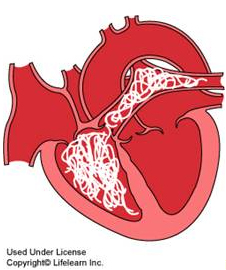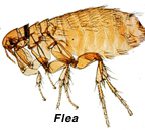Heartworm & Flea/Tick Preventions and Education
When they bite, mosquitoes can transmit heartworm infection. And those heartworms can wreak havoc on your dog or cat.
Heartworm Prevention
In dogs, signs of heartworm disease can range from coughing, fatigue, and weight loss to difficulty breathing and a swollen abdomen (caused by fluid accumulation from heart failure). Canine heartworm infection can also lead to a life-threatening complication called “caval syndrome” (a form of liver failure); without prompt surgical intervention, this condition usually causes death.
Although often thought to not be susceptible to heartworm infection, cats can indeed get heartworms. Cats can suffer from a syndrome referred to as heartworm-associated respiratory disease (HARD); the symptoms can be subtle and may mimic those of asthma or allergic bronchitis. Signs of respiratory distress, such as rapid or difficult breathing, wheezing, and panting, are common. Other symptoms include coughing, vomiting (typically unrelated to eating), and loss of appetite or weight. Heartworm infection is more difficult to diagnose in cats than it is in dogs.
Flea Prevention and Control
Fleas can cause problems for pets ranging from minor to life-threatening. Not only can these parasites cause severe itching, irritation, and allergies, but they can also transmit tapeworms and diseases. Fleas can infest dogs, cats, ferrets, mice, and rats. And fleas don’t just stay on pets; they can bite people, too. For more information, contact us or see the flea article in the Pet Health Library on our site.
You don’t want these blood-sucking parasites on your pet or in your home. We can help keep them away or help you get rid of them if they’ve already found their way inside. Call us to find out how to eliminate and control fleas or to start your pet on a preventive today.
Ticks Prevention
Ticks are becoming more and more prevalent in North America, and they’re now being found in areas where people and pets didn’t previously encounter ticks. These parasites aren’t just a nuisance; they can cause serious—and sometimes deadly—diseases, including Lyme disease, Rocky Mountain spotted fever, babesiosis, ehrlichiosis, and tick paralysis. Contact us immediately if your pet starts coughing or has joint pain, trouble breathing, fever, weakness, or loss of appetite, weight, energy, or coordination.
The best method for keeping ticks off your pet is by keeping your dog or cat on a tick preventive. Even indoor-only pets are at risk because ticks can hitch a ride inside on your clothing or shoes. Tick preventives are safe and highly effective at controlling ticks and the diseases they carry. Call us to get your pet protected today!
Don’t panic if you find a tick on your dog or cat, even if your pet is on a preventive. Some preventives kill ticks after they’ve come in contact with your pet. Ticks can hide easily under your pet’s fur, so as an added measure of protection, we recommend checking your pet for ticks every time your pet comes in from outside. Please don’t hesitate to ask us any questions you might have.
Veterinary Services
Below are all of the veterinary services we offer at Treehouse Animal Clinic. If you have any questions regarding our services, please feel free to call us.



